Stanford Law School Celebrates the Graduating Class of 2023
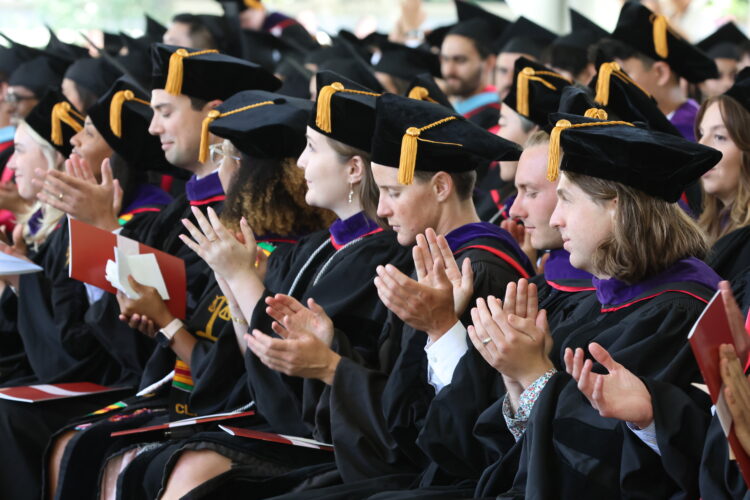
This year’s 271 graduates of Stanford Law School (SLS) celebrated their accomplishments and looked ahead to the future during their commencement ceremony on June 17, 2023. The 177 JD, 85 LLM, 7 JSM and 2 JSD students received their diplomas, cheered, and celebrated under a large tent in front of the law school’s Canfield Courtyard.
Richard E. Lang Professor of Law and SLS Dean Jenny Martinez welcomed the students, their families, and other guests and encouraged them to reflect on this significant milestone citing the graduates’ “daunting and imperfect introduction to SLS” in August 2020 during Covid-19 and in the midst of the devastating California wildfires.
“I want to recognize what this class, in particular, has endured, and the strength that came from that experience. You have emerged from the pandemic with resilience and a greater appreciation for the importance of community,’ said Martinez. “You can now close the chapter of mixed experiences that you had here at SLS and look toward your new careers and life post-law school with optimism.”
“Lead with your humanity”
During her charge to the class of 2023, Martinez encouraged the graduates to consider the rapid technological changes taking place in the world and the impact artificial intelligence and other advances will have on the legal profession.
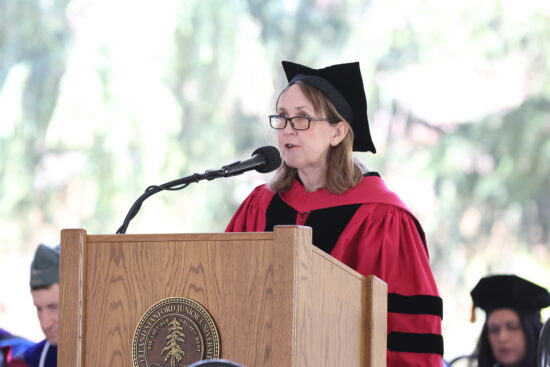
“Advances in technology, indeed some of the new tools created around us in the Bay Area and on this very campus, are poised to transform the legal profession and society itself in profound ways,” said Martinez.
Martinez pressed the graduates to utilize and master new technologies, but reminded the audience that “in a world where our interactions are increasingly mediated by technology, it can be easy to lose sight of our common humanity and the respect for human dignity that we owe one another.”
Martinez ended her charge to the class of 2023 with a reminder of the knowledge and skills they’ve attained during the last three years. “If you have learned anything in your time at SLS, in classes and seminars, clinics and policy labs, pro bono projects and summer jobs, I hope you have internalized that legal rules are not mere abstractions or logic puzzles, but systems that have profound implications for individual human beings, families, and communities. Cases, and laws, are ultimately about people.”
A Second Hurlbut Award for Greg Ablavsky
The graduating class awarded the John Bingham Hurlbut Award for Excellence in Teaching to Greg Ablavsky, the Marion Rice Kirkwood Professor of Law. This was the second Hurlburt Award for Ablavsky, who also was selected for the honor by the graduating class of 2019. The award is given annually to an SLS professor who “strives to make teaching an art.”
In his acceptance speech, Ablavsky also reflected back on the significant events that permeated the graduates’ time in law school as well as the larger changes that have occurred in society since he received the award in 2019. “The last three years have been hard,” said Ablavsky.
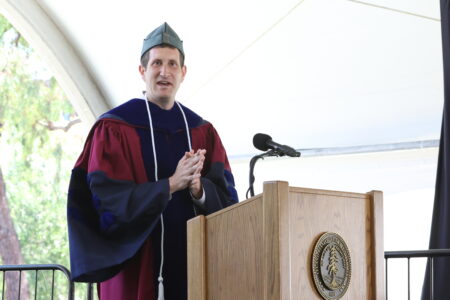
After joking that his reputation “for being nice and having fun classes” was the main reason he received the Hurlbut Award twice, Ablavsky expounded on the difference between “nice” and “good” and turned to a quote from Stephen Sondheim’s Into the Woods. “After being deceived by the wolf, Little Red Riding Hood sings, ‘nice is different than good.’ I’ve been thinking a lot lately about those words–in particular, about what it means to do good in the world of profound loss and rancor that we confront.”
Ablavsky went on to predict the future for each of the graduates sitting in front of him. “Whatever you do—whether you do public interest, or work in private practice or in government or in academia—you will find yourself embedded in a complex set of institutions. You will play a role. With luck, you will get good at that role, prove yourself, build networks. And as that happens, you will assume, or have thrust on you, ever-more responsibilities and obligations…that privilege and power will make all the more pressing the question we began with—how to do good in this world of institutions and responsibilities.”
Ablavsky advised the graduates to recognize that these positions of power in institutions are not deserved, they are earned. And, to understand that “institutions, like people, will fail and disappoint you; they will fall short.” “At the end of the day, institutions aren’t real; people are…and that is the source of tremendous meaning and even joy.” To explain, he returned to the responsibilities and obligations that come with seats of power. “When viewed through this lens, all the mundane, institutional, bureaucratic tasks I described—the long emails, the meetings, the letters, the phone calls—become acts of commitment. In other words, your life will not be split between the tedium of the daily grind and the deep meaning that comes from serving others. It will not feel like it on many days, but they are actually the same thing.”
“Your labor will be a form of love. And that, I would argue, is one way to be good in a constrained and difficult world,” concluded Ablavsky.
LLM and JD Students Offer Advice to the Class
Three graduates were selected by their fellow students to provide remarks during the ceremony: LLM student Ana Julia Grein Moniz de Aragão and JD students Eduardo Andrés González and Royce Simón Chang.
“Together, We Are Unstoppable”
De Aragao greeted her fellow advanced degree students with a few facts. “We gather here as outstanding legal practitioners from 27 different countries, ranging from Honduras to the Philippines, passing through Kenya and Kazakhstan. We are the true meaning of diversity.”
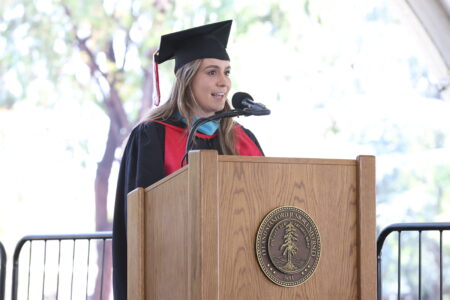
De Aragao talked about the different paths, but a similar sense of a restless need to learn, that led each advanced degree student to SLS. “Here, we explored the various meanings and manifestations of freedom and democracy, pushing us to reframe our roles as lawyers and lawmakers. Most importantly, we learned to look beyond our differences, overcoming cultural barriers that, at first glance, would seem too big. But, they are never too big, Never!”
Focusing on the connections made during their time at Stanford, de Aragao urged her fellow graduates to take with them to their countries and careers, the spirit of community they found at SLS.
“What truly matters is the intention to sincerely connect, with respect and an open heart. With this renewed confidence in our deep, mutual respect, be bold about your life choices. Embrace the restless feeling that brought you here, trust that whatever life throws at you, you will excel.”
“Sin Miedo (Without Fear)”
González and Chang presented their remarks together, riffing off each other in a fun and very heartfelt presentation. Chang talked about learning through fear and described a formative experience at a job in a sushi restaurant where, when he was very carefully cutting a fish, his chef mentor told him, “‘You need to use the knife sin miedo–without fear.’ Yes, you might mess up one fish, he said. But it’s the only way you’ll learn. And while I was still careful to not mess up too many fish, I promised myself that I would learn to embrace mistakes not as failures, but as learning opportunities.”
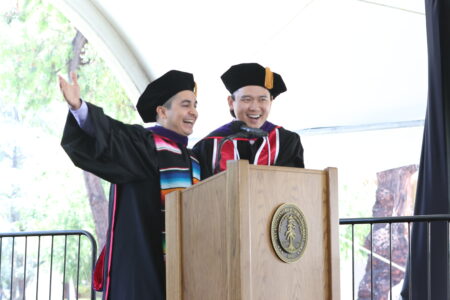
Both Chang and González emphasized the difficulty of learning from mistakes amidst the pressures experienced in law school and the possibility of losing hope and a sense of optimism when faced with discouragement and defeats, especially when learning about setbacks in the law and “when courts strip rights from millions, when hope will feel as easy to forget as it was to learn.”
“But when those days come, I’ll think about standing here, under this tent, with all of you. I’ll think of learning to let ourselves fail, to let ourselves grow, and to let ourselves start over. Of course we won’t know what’s coming just around the corner. But that is no reason not to get back on the bike, and keep on pedaling,” said González.
2023 Student and Staff Awards
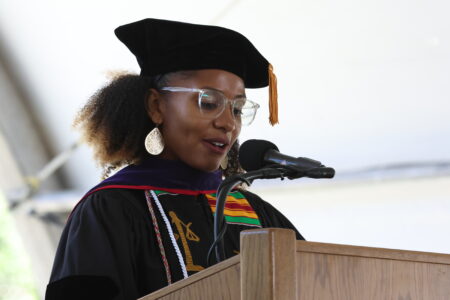
Elóra Henderson was chosen for the 2023 Dean’s Award for Excellence in Service to Stanford Law School. The award recognizes a graduating student who has made distinctive and exceptional contributions to legal education or the quality of student life at SLS. Award recipients are chosen collectively by their peers and the law school faculty and staff for active and sustained efforts that both enrich the Law School community and reflect the principles and standards of excellence of SLS. Henderson served as Executive Editor of the Stanford Law Review.
The 2023 Staff Appreciation Award was presented to Mike Winn, director of SLS’s pro bono and externship programs and lecturer in law. The SLS Staff Award is given to the staff person, administrator, or faculty member “who has played an integral role in the lives of the graduating students.”
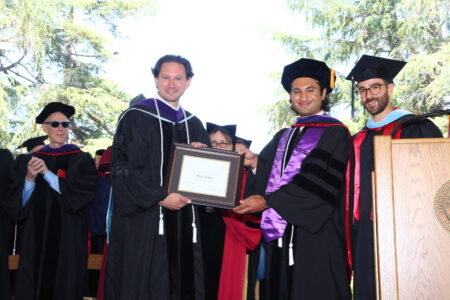
Class president Nikhil Shiva presented the award to Winn with an enthusiastic endorsement of Winn’s guidance and unbridled enthusiasm for pro bono work. Shiva pointed out the large number of graduates who participated in SLS’s pro bono program.
“The hours and hours of pro bono work done by SLS students, faculty and staff are in no small part due to Mike Winn’s unwavering support and guidance,” said Shiva.
During their three years at SLS, the graduating class logged a total of 18,484 pro bono hours, which equates to just over 2,310 days of one attorney’s work or, otherwise put, more than nine years of one attorney’s full-time work.
120 members of Class of 2023 achieved Pro Bono Distinction: 19 graduated with Highest Distinction for completing at least 300 hours of pro bono work, 30 graduated with High Distinction for completing at least 150 hours; and 71 graduated with Distinction for having logged at least 50 hours.
In addition to the hours logged by the students, 53 faculty and staff each performed more than 50 hours of pro bono work this year.

